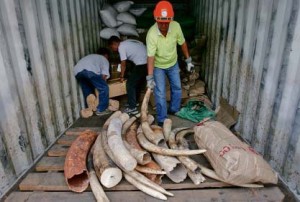Philippines probes alleged church link to ivory

ELEPHANT tusks from Tanzania were found inside two container in this photo taken in Manila on May 20, 2009. INQUIRER FILEPHOTO
MANILA—Philippine authorities said Wednesday they had launched an investigation into the possible involvement of Catholic priests in the illegal trade of African ivory.
The inquiry came after a National Geographic report said church ownership of religious icons made from ivory was widespread in the mainly Catholic country of about 100 million people, officials said.
Investigators said the probe would initially focus on two priests quoted in the article, one of whom allegedly gave the magazine a list of known ivory carvers in Manila and advice on how to smuggle statues abroad.
“We already knew… that the Philippines is a trans-shipment point of illegal tusks, and that they are smuggled out as religious icons,” Mundita Lim, head of the Protected Areas and Wildlife Bureau, told AFP.
“But this is the first time that a link with some prominent members of the church is being established for being involved in the illegal trade.”
National Bureau of Investigation agents were this week sent to question church leaders in Cebu, the Philippines’ second biggest city, where one of the priests owns a vast collection of icons, investigation head Sixto Comia said.
“We are looking at possible criminal liability here. We will be investigating their artefacts and how they were acquired,” he told AFP.
“This is very saddening that some of these priests may be involved in the illegal trade of ivory.”
Comia said investigators would look into whether the two priests had any links to smugglers of 13.1 tonnes of Tanzanian elephant tusks seized in 2005 and 2009, as well as a shipment of six rhinoceros horns this month.
The maximum penalty for possessing illegal ivory in the Philippines is four years in jail.
Cebu Archbishop Jose Palma, who also heads the Catholic Bishops Conference of the Philippines, released a statement Wednesday emphasising that the church did not approve of any trade in illegal ivory.
He also questioned the veracity of the National Geographic article, saying it “smacks of bias against religious practices”, but did not comment on whether the two priests named had indeed possessed illegally obtained ivory.
Archbishop Oscar Cruz, a senior member of the CBCP, said the church owns a collection of ivory statues across the country, but said these were pieces obtained well before an international ban on new ivory was put in place.